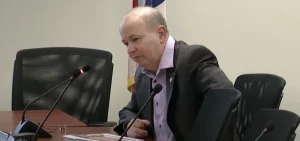News
State lawmaker reintroduces a bill to limit the power of the Ohio State Board of Education
By: Jo Ingles | Statehouse News Bureau
Posted on:
COLUMBUS, Ohio (Statehouse News Bureau) — A bill to take power away from elected members of the Ohio State Board of Education has been reintroduced after falling short in the Ohio General Assembly last year.

Before formally introducing it, Sen. Andy Brenner (R-Delaware) told Ohio State Board of Education members about the bill being reintroduced. He said the bill is a priority and is the first one to be introduced in that chamber.
“Senate Bill 1 will put basically the governor in charge,” Brenner said.
That’s something Ohio governors have wanted for decades but the intensity for advancing a bill to do this was amplified after the November election when three new members, all backed by teachers’ unions, were elected to the board.
This bill will create a position, accountable to the governor, that will oversee much of the educational policy now being handled by the state board.
It would give Ohio lawmakers some authority to override the governor. Brenner said this bill is needed because the state school board is not effective in some areas. For example, he said it’s been 18 months and the board has yet to pick a permanent superintendent.
“You’ve got to have somebody lead the department who doesn’t have the title ‘interim’ in front of them,” Brenner said.
Brenner said the board should have oversight over the $23 billion investment in schools and do more to deal with districts where students are not performing up to par.
“We need to make sure that whatever the department of Ed is recommending to local districts that are in academic distress and have been under academic distress that they are given the right guidance so we can get these kids back to learning and being able to succeed,” said Brenner.
He continued, “I think it is embarrassing when the passage rate in East Cleveland this past year was 2.1% in 8th grade math and a low-single-digits in Youngstown — this board should be pounding on the department to get that fixed and those local districts.”
But there continue to be critics of the bill including Teresa Fedor, one of the new board members elected in November. Before that, she was one of Brenner’s Democratic colleagues in the Senate.
Fedor opposed the bill then — and she opposes it now.
“This is a ruse to take over public education and hand it over to their friends, then corruption begins,” Fedor said.
Fedor said the notion that somehow the governor or legislature would be more accountable to voters isn’t borne out with facts, like those surrounding the collapse of the state’s largest online charter school, Electronic Classroom of Tomorrow, which still owes the state millions of dollars.
“It’s clearly a power grab that will silence the voice of the people and local control. This is a local control state and Republicans — we know — can’t be trusted. All we have to do is look at ECOT and 25 years of not funding schools constitutionally,” Fedor said.
Fedor noted, as it stands now, eight of the 19 members of the Ohio State Board of Education are appointed by the governor.
“Let’s take a look at the last, I don’t know, 26 years. Who has been in charge? The Republicans. It’s their board. They take direction mainly from the governor. And, in fact, those appointed board members are afraid to make decisions in a bold way because they’ve got to check in with their boss,” Fedor said.
Brenner said this time around, the bill won’t contain two controversial measures involving vaccine requirements and transgender athletes, which were added to the previous bill late in the lame-duck session last month.
“Those things are not included in the bill because we wanted to make it about restructuring the state board and oversight,” Brenner said.
Brenner promised there will be public hearings on the new bill and he invited school board members to give their input on the legislation too. Brenner said the bill could be passed as a standalone bill or placed in the new two-year state budget.

